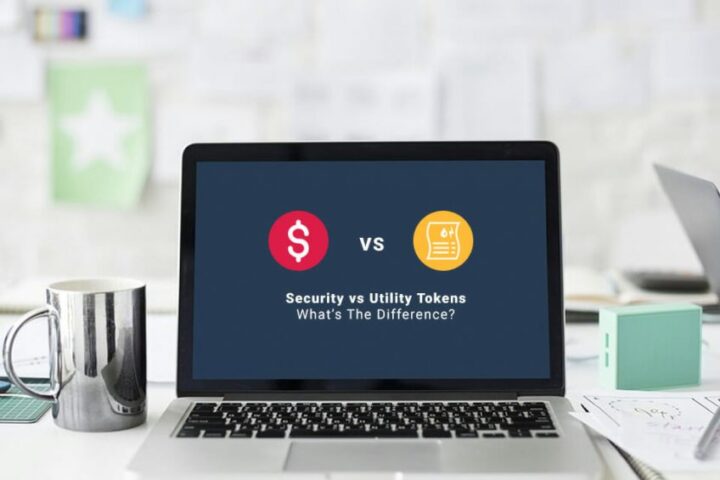- Developers
- Developer Blog
- FinTech Software Development
- Utility Tokens vs. Security Tokens Comparison Guide

profile

By Aran Davies
Verified Expert
8 years of experience
Aran Davies is a full-stack software development engineer and tech writer with experience in Web and Mobile technologies. He is a tech nomad and has seen it all.
Need a comparison guide on utility tokens vs. security tokens? In this article, we will compare utility tokens vs. security tokens in detail.
The Difference Between a Coin and a Token Is Important in Understanding the Utility Tokens vs. Security Tokens Comparison
All cryptocurrencies are a form of money. However, not all of them are coins. Bitcoin is a coin because its’ purpose is to facilitate payments across a decentralized network.
Ethereum and Ripple have other use cases, e.g. to facilitate smart contract use in the case of Ethereum. Despite this, like Bitcoin, they also facilitate payment transactions across a decentralized network. However, these still classify as coins. But why is this the case?
There is another test to judge whether a particular cryptocurrency classifies as a coin. If the cryptocurrency has its own underlying blockchain, then it‘s a coin. Bitcoin, Ethereum, and Ripple have prominent payment use cases, and they also have their own blockchain network. This is why they are coins.
Other cryptocurrencies don’t classify as coins. For e.g., the ’Golem Project‘ has a cryptocurrency, GNT. You need GNTs to use the Golem DApp. However, the project is built on top of the Ethereum blockchain, and that platform has its‘ native cryptocurrency, i.e. Ether (ETH).
While GNT may have token value, it‘s built on another blockchain, which utilizes another native cryptocurrency. Hence, GNT isn‘t a digital coin but a token.
Therefore, if a token has a payment use case as its’ primary function and has its’ own blockchain, then it is a coin. However, if the tokens are secondary digital assets and are not supported by their own blockchain then they are tokens.
Utility Tokens vs. Security Tokens: What’s the Fundamental Difference?

What are security tokens?
According to this definition of what constitutes security from Investopedia, Investment securities are tradable financial assets, e.g. equities and fixed-income instruments. Investors purchase and hold them with an expectation of future profit. In short, if you buy a security then you have some ownership or stake in the company.
In the US, the SEC determines whether a transaction is a security or not by conducting the ’Howey Test‘. The Supreme Court in the US mandated this test after it was created in 1946.
While I will not go into the complete legal explanation of the Howey Test, there are two conditions mandated by this test that you need to know. These are the following:
Hire expert developers for your next project
- If you purchase a financial commodity with an expectation of a future profit, then it’s a security. If the primary objective of the commodity is to make a future profit, it qualifies as a security.
- Is there a single issuer for the financial instrument? In that case, someone is in charge, and it’s a security. On the other hand, if a democratic network governance-based organization issues it, then it’s not security.
If you are buying tokens in an initial coin offering with the expectation of future profit, you are buying securities. If you are not sure then you can apply the Howey Test to confirm whether you are in fact buying securities.
What are utility tokens?
Siacoin is a good example of a utility token. Its primary use case is to allow people to use the Sia network, i.e. the decentralized cloud storage network built using blockchain technology.
Token transfer within the network acts as a payment for service consumption. While tokens do appreciate when the network becomes more and more popular, this is not their primary use case.
It‘s the Sia network that acts as the entity in charge of issuing Siacoin. This fact means that the token fails in this aspect of the Howey Test. Also, since the primary objective is to access a service, Siacoin is not a security but rather a utility token.
The security tokens represent a stake in the company, whereas the utility tokens don‘t.
An investor expects a steady appreciation of a security token as a return on their investment. The natural demand-supply equation makes constant corrections to the value of any one utility token.
If the utility token appreciates a lot, it can result in the product or service being seen as being too expensive, so the demand will drop. This reduces the price, helping the demand to pick up again.
This is an endless cycle that causes constant variation in the price of user tokens. If you are one of those Bitcoin investors who found themselves saying after the crash of late December/Early January that the price “will go back up”, you will no doubt understand that this is not always the case.
How Does the Fundamental Difference Between Security and Utility Tokens Affect Initial Coin Offerings?
In the USA, the ’Securities Act of 1933‘ governs the securities in the US, and has two main objectives:
- The issuers of the securities must provide the financial and other relevant information to the investors;
- Prevention of deceit, misrepresentations, and other fraudulent activities.
The SEC in the US is the regulatory authority that oversees the securities industry. Issuers must register their investment contracts with the SEC. Dealing in securities without appropriate registration can result in lawsuits, fines, penalties, and even imprisonment.
There are important disclosure requirements, for e.g. corporate reporting, disclosures related to proxy solicitations, etc. The SEC also has broad authority to oversee the securities market to prevent unlawful activities such as insider trading.
All issuers of securities need to comply with important ’know-your-customer‘ (KYC) and ‘anti-money laundering‘ (AML) requirements. These are costly and take time.
Securities must comply with these regulations.
Now let’s look at what‘s happening with ICOs:
- Firstly, start-ups create their tokens, whitepapers, websites, and other marketing material. They then launch their initial coin offering. Most ICOs are in fact security tokens, but many are disguised as utility tokens citing one or more primary use cases that make them appear as utilities. They do this because utility tokens don‘t need to abide by securities regulations.
- Aggressive marketing strategies try to sell the idea of huge profits to investors. Remember that regulators work on the ‘substance over form’ principle. Even a utility token, if sold with the expectation of future profit, qualifies as a security!
- Start-ups regularly fail to register their offerings with the SEC and don’t follow any of the reporting and disclosure requirements. These companies risk prosecution.
The Regulator Steps In
The crypto market cap currently hovers around $300 billion. ICOs raised an estimated $5 billion already in the first 3 months of 2018. With so much money pouring in, it seemed inevitable that regulators would act.
In the US, regulators stepped in to set up an official cryptocurrencies task force. They have already sent out eighty subpoenas to the issuers of the crypto tokens. The SEC has already put non-compliant ICOs, e.g. Tezos, and Centra, on notice. The SEC is also questioning existing projects, e.g. ICONOMI to find out if they were in breach of the law.
Most blockchain start-ups now recognize the importance of being on the right side of the regulations and many have taken the effort to issue SEC-compliant security tokens. For e.g.:
Hire expert developers for your next project
1,200 top developers
us since 2016
- tZero: A blockchain platform for capital markets;
- Polymath: A blockchain platform for tokenizing securities;
- Corl: Their blockchain platform is for funding start-ups and small businesses.
It‘s clear that the SEC isn‘t against ICOs. Rather they are simply cracking down on start-ups that have issued security tokens that flout existing laws.
This attempt to undermine the law does not present risks for investors, but also for future blockchain-cryptocurrency projects.
Utility Tokens vs. Security Tokens Comparison Matters Due to the Lack of ICO Regulation and the Associated Risk to the Investors
ICOs are hot. Back in 2017, blockchain-cryptocurrency start-ups raised $ 5.6 billion through ICOs. There were a total of 902 ICOs in 2018.
The unregulated nature of ICOs provides multiple advantages to start-ups, who can avoid the paperwork and hassle involved when they are to raise funds from Venture Capital (VC) funds.
Instead, companies can create crypto tokens using popular platforms like the Ethereum blockchain. To launch their own ICO, companies only need to create a professional-looking website, draft a well-written whitepaper, and market their ICO digitally.
If their ICO is a hit, then they could raise millions of dollars without needing to borrow a dime! Raising funds from Venture Capitalists involves a lot more stress and rigor.
ICOs also remove the barrier that keeps many individuals from entering the investment market. In the US, only individuals with at least US $ 1 million in semi-liquid net worth excluding their primary residence can become accredited investors.
Alternatively, individuals can qualify if they earn in excess of US $ 200k per annum in net income for at least 2 years prior to applying. For families, the threshold is $ 300k per annum.
Their popularity notwithstanding, ICOs still remain largely unregulated. This means that investors have very little legal protection against unfair practices.
It is for this reason that you must be aware that you invest in ICOs at your own risk. With no regulatory agencies overseeing ICO launches, never invest money that you cannot afford to lose.
ICOs and Fraud
There are a number of ways that unscrupulous companies aim to benefit from ICOs. One such example is the pyramid scheme, where new members are enrolled with a promise of payment or other services if they, in turn, enroll new members.
There is really no product or service behind the ICO. Once enrolling new members becomes impossible, most members make little to no profit at all but rather incur big losses when the value of the token plummets.
Pyramid schemes are illegal in most countries, but rogue companies have found ICOs an excellent way to get around these laws to raise ‘free’ money.
Fortunately, there is a way to identify such schemes, and the crypto community keeps a close watch on such potential scams and alerts other investors via forums, etc.
However, the risks still remain. Another risk that results from a lack of regulation around ICOs is the possibility that you invest in a crypto token that should‘ve been categorized as a security token but wasn‘t. Should this occur then your funds may be frozen for a long time while regulators undertake an investigation against the start-up.
In the US, the Securities and Exchange Commission (SEC) published a report in 2017 where they categorized DAO tokens as securities. Since hardly any companies had declared their tokens as securities in 2017, many investors may have found themselves caught out by this change in the law.
The Risk of Disguised Security Tokens
By now, you know that unregulated ICOs represent a potentially high-risk investment for anyone. Some start-ups don’t abide by regulatory requirements and risk being shut down. In the case that things go wrong, you don’t have legal recourse against malpractices.
Hire expert developers for your next project
Even the utility tokens sold with the promise of profit are at risk. Consider the example where a blockchain start-up launches ICO for an online game and tokenizes it. It positions the token as a utility token, with the promise of high profit. The following sequence of events is likely:
- The ICO with a low price of the token, e.g. $ 0.01 was successful.
- The game becomes viral, and the token appreciates 100 times, to $ 1.
- The new players will now no longer spend a cent, but a dollar, to play the game.
- Remember that this is not a high-value service like the Sia network, and the new players will soon become disillusioned to spend a dollar just to play a game every time. They will exit, bringing down the value of the token with them.
- Soon it will be the end of the project, with the negative sentiments prevailing in the crypto community proving too heavy a burden.
Utility tokens serve where the project has a long-term valuable product or service.
Now, consider that institutional investors won‘t enter the ICO crypto space with unregulated crowd sale events selling security tokens disguised as utility ones. You can see how future blockchain-cryptocurrency projects will miss out on the big capital if this continues to happen.
Utility Tokens vs. Security Tokens: Regulated Security Tokens Are the Answer
Let‘s face it: strict regulation is needed. Blockchain-cryptocurrency start-ups can‘t avoid regulations over the long term if the industry is to grow to its full potential.
Investors of all shapes and sizes need protection from fraudulent practices, misrepresentations about the nature of the investment contract, and Ponzi schemes. Token holders will lose trust in the system if their reasonable interests aren’t protected.
The practice of selling security tokens disguised as utility tokens, without following the due processes that help to protect the investors, is not a good long-term business practice. It certainly isn’t sustainable and this is why we need regulation.
It is true that there are more inconveniences of having to register such tokens as securities, including the need to conduct reports, disclosures, and also abide by KYC, and AML processes.
However, this short-term cost is certainly far more desirable to the industry as a whole than a massive loss of investor confidence in the blockchain-cryptocurrency projects which is likely to occur from the negative press generated by fraudulent ICOs.
The regulatory bodies in multiple countries are already working on formulating appropriate regulations for the blockchain-cryptocurrency space.
While we wait for them to come up with suitable guidance, start-ups should take the first step and self-regulate by being sure to declare security token offerings as securities and follow the regulations for this digital asset class.
This is in the long-term interest of the industry. and will ensure the good health of the ICO industry for years to come.
If you are planning to invest in crypto or blockchain technology for your business, you will need expert individuals. DevTeam.Space can help you with an experienced team of blockchain developers. Write to us your initial project requirements and one of our technical managers will get back to you for further assistance.
Frequently Asked Questions
This is a difficult question. While the vast majority of early investors have made money, you are hedging your bets that the value of the tokens will keep rising. As many Bitcoin investors found out in late 2017, the price can also come down as well as go up.
It is a digital token or crypto coin that can be used to pay for something. The value of a cryptocurrency token can fluctuate, something which has led to huge speculation in cryptocurrencies.
These are digital tokens or coins that can be used as an asset provided that they can pass the Howey Test. A security token represents an investment token.

Alexey Semeney
Founder of DevTeam.Space
Hire Alexey and His Team
To Build a Great Product
Alexey is the founder of DevTeam.Space. He is award nominee among TOP 26 mentors of FI's 'Global Startup Mentor Awards'.
Hire Expert Developers




